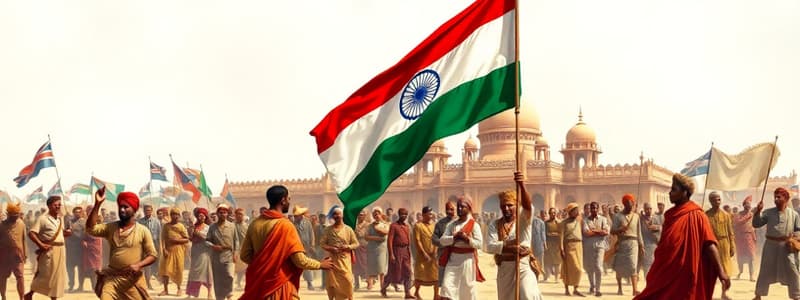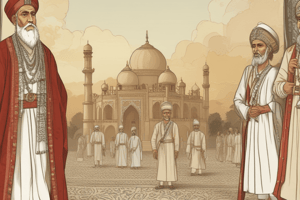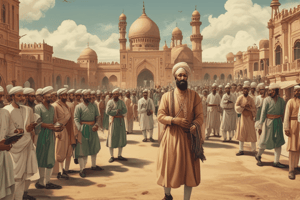Podcast
Questions and Answers
What major event led to the dissolution of the British East India Company in 1858?
What major event led to the dissolution of the British East India Company in 1858?
- The signing of the Treaty of Amritsar
- The establishment of the British Raj
- The military defeat during a massive uprising (correct)
- The independence movement started by Gandhi
What was the primary goal of Mahatma Gandhi in leading India toward independence?
What was the primary goal of Mahatma Gandhi in leading India toward independence?
- To establish a monarchy in India
- To maintain the British Raj structure
- To encourage self-sufficiency among Indians (correct)
- To promote violent resistance to British rule
What was one consequence of the partition of India in 1947?
What was one consequence of the partition of India in 1947?
- Creation of a unified Indian state
- Expansion of British colonial territories
- Negotiations for continued British presence
- A significant humanitarian disaster (correct)
Which event marks the beginning of the British Raj in India?
Which event marks the beginning of the British Raj in India?
How did Churchill's legacy affect India's perception of British rule?
How did Churchill's legacy affect India's perception of British rule?
What change occurred in Africa in 1884?
What change occurred in Africa in 1884?
By 1914, what percentage of Africa was colonized?
By 1914, what percentage of Africa was colonized?
What was a significant consequence of the Scramble for Africa for the Indigenous peoples?
What was a significant consequence of the Scramble for Africa for the Indigenous peoples?
What did the indigenous people initially believe the Portuguese to be upon their arrival?
What did the indigenous people initially believe the Portuguese to be upon their arrival?
What symbol is depicted in the description of Cecil Rhodes in relation to Africa?
What symbol is depicted in the description of Cecil Rhodes in relation to Africa?
Which of the following powers was NOT involved in the Berlin meeting of 1884?
Which of the following powers was NOT involved in the Berlin meeting of 1884?
What triggered fear among the indigenous population during the arrival of the Portuguese?
What triggered fear among the indigenous population during the arrival of the Portuguese?
What was the response of the ancestors of the Ende people to the arrival of the Portuguese?
What was the response of the ancestors of the Ende people to the arrival of the Portuguese?
What sentiment did the Indigenous peoples likely feel towards the European invasions?
What sentiment did the Indigenous peoples likely feel towards the European invasions?
Which of the following feelings best describes the overall sentiment expressed about the impact of Europeans on the indigenous people?
Which of the following feelings best describes the overall sentiment expressed about the impact of Europeans on the indigenous people?
What was one reason for the meeting in Berlin regarding Africa's division?
What was one reason for the meeting in Berlin regarding Africa's division?
What is a major impact of the Scramble for Africa on Indigenous cultures?
What is a major impact of the Scramble for Africa on Indigenous cultures?
According to the perspective shared, what was considered a legacy of the European invasion?
According to the perspective shared, what was considered a legacy of the European invasion?
What technological perception did the indigenous people have of the Europeans?
What technological perception did the indigenous people have of the Europeans?
What did the chiefs and wise men of the indigenous community believe about the Europeans?
What did the chiefs and wise men of the indigenous community believe about the Europeans?
What was a common reaction among people upon realizing the destructive impact of European presence?
What was a common reaction among people upon realizing the destructive impact of European presence?
What significant action did King Léopold II take in the Congo during the early 1880s?
What significant action did King Léopold II take in the Congo during the early 1880s?
What method did Léopold use to control Indigenous peoples in the Congo?
What method did Léopold use to control Indigenous peoples in the Congo?
What was a consequence for Indigenous peoples who resisted Léopold's policies?
What was a consequence for Indigenous peoples who resisted Léopold's policies?
When was control of the Congo handed over to the Belgian government?
When was control of the Congo handed over to the Belgian government?
What was a notable characteristic of King Léopold's management of the Congo?
What was a notable characteristic of King Léopold's management of the Congo?
How does cobalt produced in the DRC relate to global demand?
How does cobalt produced in the DRC relate to global demand?
What impact did European empires have by the early 20th century?
What impact did European empires have by the early 20th century?
Which statement accurately reflects the British East India Company's authority?
Which statement accurately reflects the British East India Company's authority?
Flashcards
European Arrival as Spirits
European Arrival as Spirits
The arrival of Europeans in Africa was seen as a supernatural event by the indigenous people, who believed the Europeans were spirits of the dead.
Vumbi
Vumbi
The Portuguese explorers were initially perceived as "vumbi", ancestral ghosts, by the African people.
Impact of European Arrival
Impact of European Arrival
The European arrival caused significant disruption to the way of life for the African people, leading to wars, misery, and displacement.
Emotions Evoked by European Arrival
Emotions Evoked by European Arrival
Signup and view all the flashcards
Language Barrier
Language Barrier
Signup and view all the flashcards
Technological Advantage
Technological Advantage
Signup and view all the flashcards
Legacy of European Invasion
Legacy of European Invasion
Signup and view all the flashcards
Interpretations by Wise Men
Interpretations by Wise Men
Signup and view all the flashcards
Scramble for Africa
Scramble for Africa
Signup and view all the flashcards
Berlin Conference (1884)
Berlin Conference (1884)
Signup and view all the flashcards
Cecil Rhodes
Cecil Rhodes
Signup and view all the flashcards
Impact of Scramble for Africa
Impact of Scramble for Africa
Signup and view all the flashcards
Indigenous people of Africa
Indigenous people of Africa
Signup and view all the flashcards
Land dispossession
Land dispossession
Signup and view all the flashcards
Cultural suppression
Cultural suppression
Signup and view all the flashcards
Forced labor
Forced labor
Signup and view all the flashcards
What was the British Raj?
What was the British Raj?
Signup and view all the flashcards
Who was Mahatma Gandhi and what was his role in Indian independence?
Who was Mahatma Gandhi and what was his role in Indian independence?
Signup and view all the flashcards
What was the partition of India and its consequences?
What was the partition of India and its consequences?
Signup and view all the flashcards
What are some legacies of the British Raj in India?
What are some legacies of the British Raj in India?
Signup and view all the flashcards
How did Winston Churchill's legacy impact India?
How did Winston Churchill's legacy impact India?
Signup and view all the flashcards
King Leopold's Exploitation of the Congo
King Leopold's Exploitation of the Congo
Signup and view all the flashcards
Berlin Conference
Berlin Conference
Signup and view all the flashcards
Coltan
Coltan
Signup and view all the flashcards
Cobalt in the DRC
Cobalt in the DRC
Signup and view all the flashcards
British East India Company (BEIC)
British East India Company (BEIC)
Signup and view all the flashcards
Imperial Legacies in Canada
Imperial Legacies in Canada
Signup and view all the flashcards
Effects of European Arrival in Africa
Effects of European Arrival in Africa
Signup and view all the flashcards
Treaty System
Treaty System
Signup and view all the flashcards
Study Notes
Age of Imperialism
- Imperialism involved major European powers expanding their global control in the 19th and early 20th centuries, particularly in Africa, Asia, and the South Pacific.
- Africans viewed the arrival of European ships with suspicion believing Portuguese travelers were "vumbi," or ancestral ghosts.
- Many Indigenous people were not consulted during the expansion of European empires.
- Europe's historical expansion and colonization had far-reaching impacts on the lives and cultures of the colonized people, often leading to conflict, displacement, and resistance.
- The 1884-1885 Berlin Conference is an example of how many European nations met to divide the continent of Africa among themselves.
- King Leopold II of Belgium, in the early 1880s, forced Indigenous Africans in the Congo region to harvest natural rubber, causing hardship and resistance.
- In the late 19th and early 20th centuries, European empires significantly changed local cultures and ways of life due to colonial expansion.
- Imperialism's legacies continue to affect people around the world today, impacting language, migration, depopulation, and displacement.
- The image of Cecil Rhodes standing over Africa depicts the concept of imperial power and control as many Indigenous peoples considered Africa as their homeland.
- The Scramble for Africa, where many European powers competed to colonize the continent, had lasting consequences for Indigenous peoples.
- In 1876, most of Africa was not colonized yet, but by 1914, 90% of Africa was under European control.
- The partitioning of India in 1947, following the withdrawal of the British, led to a humanitarian crisis with 10-20 million people displaced and 1 million deaths.
Colonial Expansion (1876-1914)
- European empires expanded their global possessions dramatically during 1876 and 1914.
- Millions of Indigenous Peoples were affected during this time, leading to new forms of conflict, and resistance.
The British Raj in India
- The British East India Company controlled large portions of India by the 1850s.
- The British exerted significant political, economic, and cultural influence, leading to both resistance and accommodations.
- The British Raj (control of India by Britain) continued until 1947, when India gained independence.
- The partition of India and Pakistan resulted in significant population displacement and loss of life.
Coltan and Connected Identities
- Coltan is a key mineral used in lithium-ion batteries, with significant global demand affecting the Congo region.
- Ethical sourcing and the treatment of mining laborers are key concerns with the extraction and production of coltan.
- Globalized demand for modern electronics has led to exploitation of workers in the Democratic Republic of Congo.
Studying That Suits You
Use AI to generate personalized quizzes and flashcards to suit your learning preferences.




